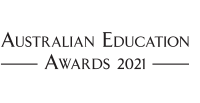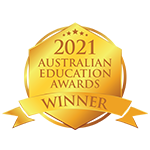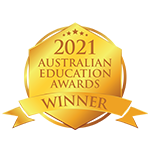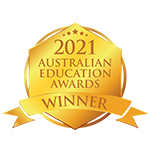- K/12
- Higher Education

Australian Education Awards 2021
Jump to winners | Jump to methodology | View PDF
EDUCATION SECTOR DEFIES ODDS TO THRIVE AGAIN IN 2021
The Australian Education Awards 2021 recognised the commitment to excellence shown by the nation’s most outstanding educators as they rose to the challenges of a year of disruption
If 2021 demonstrated anything about Australia’s education system, it was its ability to persevere, adapt and thrive amid enormous disruptions to teaching and learning.
A number of reports throughout the year showed that, while young people were heavily impacted during the COVID-19 pandemic, the tireless work of Australia’s teachers and leaders ensured that students’ academic outcomes didn’t slip.
In December, the NAPLAN 2021 National Report found no drop in student performance in reading, writing and numeracy between 2019 and 2021 at a national and state/territory level despite the massive disruptions caused by the pandemic.
The HSC 2021 results, released in January, also showed how students doing it rough in COVID hotspots persevered and produced some inspiring outcomes. Of the 89 schools represented in the First in Course release, 14 of the 33 public schools included were located in the local government areas of concern that suffered the highest infection rates.
Recognising the game changers
Working tirelessly to help young people through these tough times were Australia’s teachers, leaders and education providers whose group effort was showcased at the fourth annual Australian Education Awards 2021 on 3 December.
Educational excellence was recognised across 28 categories, including Australian School Principal of the Year, sponsored by anzuk Education; Best Use of Technology, sponsored by Box of Books; Secondary School of the Year – Government, sponsored by Education Perfect; Best School Strategic Plan, sponsored by PeopleBench; Australian School of the Year, sponsored by Tes; and Primary School Teacher of the Year – Non-Government, and Primary School Teacher of the Year – Government, both sponsored by Teachers Mutual Bank.
The much-anticipated ceremony began at 5 p.m. with introductions from The Educator’s awards sponsors and the MC for the evening, Channel Nine’s Belinda Russell, before the awards ceremony kicked off, revealing the who’s who of educational excellence in 2021.
Ormiston College took home a whopping eight awards, including Secondary School of the Year – Non-Government, Teachers Mutual Bank Primary School Teacher of the Year – Non-Government, and Box of Books Best Use of Technology.
When asked how the college had been able to maintain a high level of consistency in educational excellence across so many key areas of teaching and learning at a time of such disruption, principal Brett Webster said it was about sticking to “clear and strategic achievement priorities”.
“These consistently relate to supporting strong academic foundations, the highest-quality teaching practice, adding value through tech-enabled learning and innovation, as well as nurturing a holistic school experience that is fun and rewarding for all,” Webster told The Educator.
“With ambitious and aspirational achievement goals in these areas, our community works very intentionally to build the best possible college experience for the students of OC.”
An exemplar of excellence in regional education
Carrying the baton for excellence in regional education in 2021 was James Fallon High School, which was named Australia’s Regional School of the Year.
Like most schools, James Fallon High had its share of complex challenges during the COVID-19 pandemic, but with the help of its visionary leadership team it has been moving full steam ahead with some truly exciting and transformative work inside its classrooms.
“For Albury, a place with two postcodes, the diversity of James Fallon High School is extensive. Our vision is to live our motto, every day,” principal Jenny Parrett told The Educator.
“Our vision is to personalise learning for every child, as this is what the school believes every young person deserves. Teaching and learning is personalised so that every student is known, valued and cared for.”
Parrett said some key points of difference the school possessed included significant opportunities for personalising learning.
“Underpinning classroom practice is a diverse and specialised curriculum. With eight classes of Diverse Learning (Support Classes), a Big Picture Academy, intensive language and refugee student support groups, an extensive subject selection offering a sharing curriculum with the two other Albury high schools, there are outstanding opportunities for students to pursue their interests.”
Championing inclusion
Yarra Me School, located in Preston, Victoria, took home the Special Education School of the Year award for its successful programs that have been helping at-risk students as young as five re-engage with their learning.
The school uses evidence-based early intervention strategies to support children with behavioural and learning difficulties. Some of these children have mental health issues, are on the autism spectrum, have experienced trauma, are in the child protection system, or have other needs that put them at risk of disengaging from school.
Principal Nancy Sidoti said that while special schools were champions when it came to supporting vulnerable and disadvantaged children, this should be the mantra for all schools in all sectors.
“School can be one of the most important protective factors in a child’s life. Some of the children we see have challenging and heartbreaking family histories and are not always ready for learning,” Sidoti said.
“Despite this, the child arrives at school every day. The routines and predictability of the school day give these children grounding and stability; it’s their safe space.”
Sidoti said that as schools embarked on a new school year, educators should be mindful of building their resilience so they could respond to a school environment that had become dynamic, and at times unexpected.
“It’s also about being proactive and resourced to provide timely mental health supports,” she said.
“For special schools, it’s about understanding how anxiety or depression may look for students with a disability.”
Sidoti believes there is a real opportunity in 2022 for Social and Emotional Learning to occupy greater space in the curriculum, taught both explicitly and implicitly.
“We know that SEL can significantly improve student wellbeing, behaviour and academic outcomes. However, SEL is not a one-size-fits-all; it needs to consider the culture and needs of the school community.”
‘This award gives us the confidence to stick to our path’
Albert Park College was recognised on the national stage when it was named the Tes Australian School of the Year at the Australian Education Awards.
The school’s principal, Steven Cook, said the award was “a wonderful vindication” of the hard work the college had done since its founding in 2011 “to create a new school over the foundations of the old”.
“I see it mostly as a testament to the quality and depth of our instructional leadership and the ability of the school to convey its strengths to the local parents, who have stayed the course on our journey from creation to maturity,” Cook told The Educator.
“It proves that, with the right approach, public schools can provide the sort of education the whole community is looking for. The award gives us the confidence to stick to our path.”
Albert Park College recently began work on a new campus – the Community Arts Hub – in partnership with the Victorian College of the Arts Secondary School. The world-class performing arts centre will have two theatres as well as rehearsal and teaching rooms to find and train the creative students of the future.
“It’s extremely exciting. It adds to the Visual Arts Campus – Studio 120 – which we opened this year, modelled on an art studio we saw in Manhattan,” Cook said, adding that the college was already ahead of the digital education curve and effectively online before the lockdowns came, meaning its students took the move to remote and flexible learning in their stride.
“We have reorganised the school around positive education, creating an atmosphere of kindness and personal self-confidence. This is a cutting-edge institution.”
Read on to find out more about all the winners and excellence awardees recognised at the 2021 Australian Education Awards. Key Media and The Educator would like to congratulate all of this year’s winners and nominees, who truly exemplify excellence in the K-12 education sector.
Australian Education Awards 2021 Winners
NATIONAL AWARDS
TES AUSTRALIAN SCHOOL OF THE YEAR
- Albert Park College
anzuk Education Australian School Principal of the Year
- Dr Keith Graham OAM, Rochedale State School
SCHOOL AWARDS
PRIMARY SCHOOL OF THE YEAR – GOVERNMENT
- Rochedale State School - an IB World School
Excellence Awardee
PRIMARY SCHOOL OF THE YEAR – NON-GOVERNMENT
- Haileybury
EDUCATION PERFECT SECONDARY SCHOOL OF THE YEAR – GOVERNMENT
- Albert Park College
SECONDARY SCHOOL OF THE YEAR – NON-GOVERNMENT
- Ormiston College
BOARDING SCHOOL OF THE YEAR
- Knox Next Generation Boarding
REGIONAL SCHOOL OF THE YEAR
SPECIAL EDUCATION SCHOOL OF THE YEAR
- YarraMe School: Centre of Expertise
Excellence Awardee
PEOPLEBENCH BEST SCHOOL STRATEGIC PLAN
- Ipswich Girls' Grammar School including Ipswich Junior Grammar School
BEST STUDENT WELLBEING PROGRAM
- Haileybury
BEST REMOTE LEARNING PROGRAM
- Haileybury
Excellence Awardee
BEST PROFESSIONAL LEARNING PROGRAM
- Marsden State High School
INDIVIDUAL AWARDS
PRIMARY SCHOOL PRINCIPAL OF THE YEAR – GOVERNMENT
- Dr Keith Graham OAM, Rochedale State School
PRIMARY SCHOOL PRINCIPAL OF THE YEAR – NON-GOVERNMENT
- Rhonda Robson, St. Andrew’s Cathedral School
SCHOOL PRINCIPAL OF THE YEAR – GOVERNMENT
- Kylie Steinhardt, Marsden State High School
SCHOOL PRINCIPAL OF THE YEAR - NON-GOVERNMENT
Excellence Awardee
DEPARTMENT HEAD OF THE YEAR
TEACHERS MUTUAL BANK PRIMARY SCHOOL TEACHER OF THE YEAR – GOVERNMENT
- Georgia Moisidis, Edensor Park Public School
TEACHERS MUTUAL BANK PRIMARY SCHOOL TEACHER OF THE YEAR - NON-GOVERNMENT
- Claire Cox, Ormiston College
SECONDARY SCHOOL TEACHER OF THE YEAR – GOVERNMENT
- Bahia Malas, Blakehurst High School (former)
SECONDARY SCHOOL TEACHER OF THE YEAR - NON-GOVERNMENT
- Andrew Rogers, St. Mark’s Anglican Community School
EDUCATION RISING STAR OF THE YEAR
- Holly Millican, South Grafton High School
CURRICULUM AWARDS
BEST CO-CURRICULAR PROGRAM
- The Scots School Albury
BEST STEM PROGRAM
- Ashdale Secondary College
BOX OF BOOKS BEST USE OF TECHNOLOGY
- Ormiston College
INNOVATION IN CURRICULUM DESIGN
- KKHS Staged Learning
Excellence Awardee
INNOVATION IN LEARNING ENVIRONMENT DESIGN
- Adelaide Botanic High School
Methodology
NOMINATIONS
A nationwide call for nominations for the Australian Education Awards was conducted from February to March 2021. Any individual or school operating in the Australian K-12 education industry was eligible to submit a nomination, either on their own behalf or for another individual or school.
RESEARCH
The awards team conducted research and drew on knowledge and information gained through The Educator’s connections to the education industry in order to support and supplement nominations received and ensure that no individual or school deserving of recognition was missed.
EXCELLENCE AWARDEES
When the research was completed, excellence awardees were selected in each category (except Australian School of the Year and Australian School Principal of the Year) and notified via phone and email. Excellence awardees were announced in The Educator magazine and online.
JUDGING
The Australian Education Awards team sent completed excellence awardee submissions to an independent panel of judges who reviewed the excellence awardee submissions and allocated a score for each excellence awardee. The excellence awardee with the highest score in each category was named the winner.
WINNERS
The winners in each category were announced at the Australian Education Awards 2021 virtual event on 3 December 2021.














